

RITA ® Award-Winning Author of Fantasy Romance


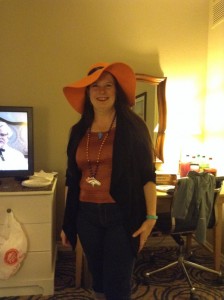 I’m over at Savvy Authors, talking about character transformation – including the course I’m teaching for them in March, Sex as a Tool for Character Transformation – and what it means that I was decked out in Broncos gear for the Super Bowl.
I’m over at Savvy Authors, talking about character transformation – including the course I’m teaching for them in March, Sex as a Tool for Character Transformation – and what it means that I was decked out in Broncos gear for the Super Bowl.
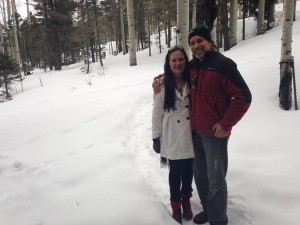
Happy Valentine’s Day, everyone! This photo is from a couple of weeks ago, celebrating 25 years with my valentine. Never imagined I’d find someone who is such a wonderful partner for me, or that we’d be together so long. Every day I give thanks for him.
This week’s topic in the Bordello is how our personal vices actually aids in our writing. Stop on by for my take on the adage, “write drunk, edit sober.“
Also, I’m teaching a webinar this week on Navigating the Lines of Consent in sex scenes. Should be big fun!
 Hey, if you’re in the Orlando area, I’ll be giving a workshop on building romantic tension via conflict. You can register here. I assume the event is designed for people to attend in person. *I* will be there via Skype. If you have questions, though, ask them, not me. I just do what I’m told. 😉
Hey, if you’re in the Orlando area, I’ll be giving a workshop on building romantic tension via conflict. You can register here. I assume the event is designed for people to attend in person. *I* will be there via Skype. If you have questions, though, ask them, not me. I just do what I’m told. 😉
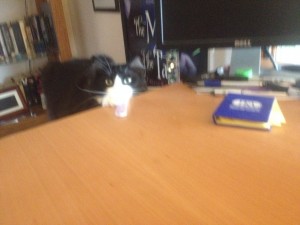 This pic didn’t come out as well as I would have wished, because Jackson was moving so fast. But he’s perched on the back of a chair next to my treadmill desk, methodically swiping things to the floor so I’ll pay attention to him. Funny cat.
This pic didn’t come out as well as I would have wished, because Jackson was moving so fast. But he’s perched on the back of a chair next to my treadmill desk, methodically swiping things to the floor so I’ll pay attention to him. Funny cat.
Before I forget, I’m teaching an online writing workshop starting next week, on October 18: Defying Gravity: Writing Cross-Genre and Succeeding Anyway. This is for my longtime online home chapter, the Fantasy, Futuristic and Paranormal Special Interest Chapter of RWA (FFP).
Genre definitions have a profound influence on writers’ careers. From the first queries where we must specify the book’s genre to long-term decisions about pursuing or giving up on a “dead” genre, dealing with what feels like a false construct is a necessary skill. However, following our hearts and inspiration often means tossing aside these considerations.
Or chopping them to pieces in a murderous rage.
But shedding conventions can be what sets a book apart. That’s what takes a writer’s career from midlist to break-out. So… how do you know? More—how do we find the courage to embrace a bold move?
In Wicked, the heroine Elphaba is faced with that crucial decision, of whether to choose the safe path or to risk flying on her own. This workshop will explore genre definitions and how Jeffe Kennedy went from being a “Crack Ho” – being told that her work fell in the cracks between genres – to receiving a nomination for Book of the Year and an RT Seal of Excellence for the one title each month that stands out from all the rest by an innovative twist on a familiar story or pushing genre boundaries. Participants will discuss their experiences with genre—both coloring inside the lines and stepping across them—and will leave inspired to take risks and follow their hearts.
Everyone deserves a chance to fly!
I’m teaching this by special request, so it should be big fun. 🙂
While that workshop is about breaking away from market considerations, I want to talk a bit about promoting books on social media. This is something authors are forced to think about, whether they want to or not. Accordingly, there’s tons of advice out there on the topic, Rule #1 of which tends to be along the lines of “Get More Followers!”
Recently one of my published author email loops went bananas with people offering to trade Facebook likes – as in, you like my page and I’ll like yours. They did the same with following on Twitter.
I think this is a really bad idea.
Sure, the numbers go up, which apparently satisfies Rule #1. But it’s not real. Worse, it creates a false idea of your social media reach.
Let me caveat before I go on that I’m friends with and following/followed by LOTS of authors. Hell, I’m writing this blog post for authors. Nothing at all wrong with that. In fact, networking with other authors can be important for building community and career opportunities.
However – creating a trade system with other authors to like one another’s pages does three things: It skews our lists to the wrong people, possibly diminishes our reach to real readers and skews our own perceptions.
Skewing our lists to the wrong people
We all know Facebook is a mystical bog of smoke and mirrors. They really want us to pay money to get followers to see our posts, so they mess with our reach. We try to game the system. They game it right back. It’s an eternal battle to be seen, on top of the usual discoverability battle. This may be growing more true of Twitter also. The only thing we can be sure of is that only a portion of our followers will see a given post. If all of our followers are people who are there because they’re interested in our books, at least that portion who sees a post will be them! If a portion of our followers are from reciprocal author trades … guess what?
Diminishing our reach to real readers
Yes, yes, yes – people will always argue that writers are readers, too. Of course we are! And, sure, I’ll like the pages of authors I want to keep track of. But that’s entirely because I want to, not through a trade. A trade isn’t organic. See above. We want people to follow and like us because they are ACTUALLY INTERESTED in our books. This might be more difficult, but they’ll be real followers. See below.
Skewing our own perceptions
As nice as it may be to look at our profiles and see hundreds or thousands of followers, as lovely an ego stroke as that may be, if a whole bunch of those are from author reciprocal trades, then it means nothing. Worse, it allows us to kid ourselves that we’re doing well in expanding our reach when we’re not. It’s a pleasant little fantasy and there’s no room for that in running a business. On the other hand, gaining *real* followers is a good measure of success – and one to be proud of.
Let’s get those real followers, people! Oh, and my Facebook author page is here.
What??? I *had* to give that a go. 😉
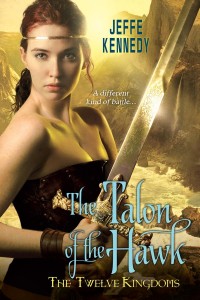 SO excited that the cover for THE TALON OF THE HAWK totally won the Hottest Heroine Cover over on Addicted to Heroines. It’s such a great cover and for such a wonderful heroine, I’m just thrilled.
SO excited that the cover for THE TALON OF THE HAWK totally won the Hottest Heroine Cover over on Addicted to Heroines. It’s such a great cover and for such a wonderful heroine, I’m just thrilled.
Coincidentally (OR NOT???), I received some fax pages yesterday from my awesome production editor at Kensington, Rebecca Cremonese. She wanted me to see the design and particularly the sword symbol in the line breaks. In celebration of this MAJOR WIN, I thought I’d share them here. Whee!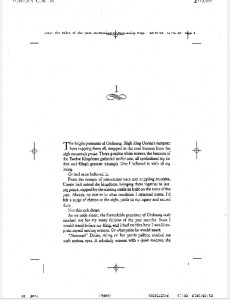
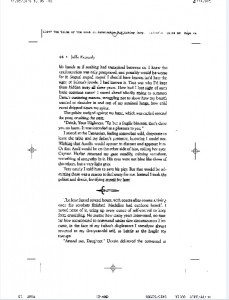 Yeah, yeah – these are screen shots of a third-generation fax. Good luck making out the text. 😀 Come on – you guys know what a tease I am!
Yeah, yeah – these are screen shots of a third-generation fax. Good luck making out the text. 😀 Come on – you guys know what a tease I am!
Speaking of teases, you can still register through today for my online workshop on Sex as a Tool for Character Transformation. You still have time to catch up on the first assignment, because it’s easy. We have a great group – 27 participants at this point – so come join in the conversation!

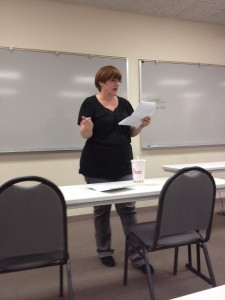 Yesterday my lovely, smart and generous friend Darynda Jones gave the workshop for our monthly local chapter meeting. Giving presentations for small groups like this can be a great way to develop conference workshops. One of five I have to offer today over at Word Whores.
Yesterday my lovely, smart and generous friend Darynda Jones gave the workshop for our monthly local chapter meeting. Giving presentations for small groups like this can be a great way to develop conference workshops. One of five I have to offer today over at Word Whores.
 The daffodils are in full bloom – always such a pleasure to see them arrive.
The daffodils are in full bloom – always such a pleasure to see them arrive.
I’m teaching an online workshop this week and next, on writing sex scenes. In the course of introductions, many of the participants mentioned that they feel nervous or awkward writing sex. I wrote up this piece as a side topic, so I thought I’d reproduce it, in part, here.
* * *
Feeling awkward writing sex scenes? Not everybody suffers from this, but more do than don’t. Very often I find that the “brand” of the erotic romance author is to be bawdy and over the top. It’s frankly not one I’m comfortable with.
Does that surprise you? If you’ve read some of my sexier books, you’ll know that I don’t shy away from much. However, that’s “in the bedroom” for me.
Yes, I’m a subscriber to the “lady in the drawing room, whore in the bedroom” approach to life. 🙂 In a polite society kind of way, not a sexist way. I think men should be gentlemen in the drawing room and animals in the bedroom, too. That’s just part of not stepping on each others’ toes. My grandmother drilled ladylike behavior into my head so thoroughly that I *still* hear her voice when I step over some line of polite behavior.
We all have this, to a greater or lesser extent. We grow up being taught what’s appropriate and what isn’t. Where those lines are depend on the family. But from the time we’re little and people are spelling out S*E*X in our hearing, we learn that there are naughty words that must not be spoken aloud and naughty acts we must never do.
Or, when we become randy teenagers and actually DO them – we mustn’t let anyone know about it.
The most important thing is to know this about ourselves. It’s not a failing. It’s being human, a person in a reasonably polite society.
That said, when I sit down to write? My grandmother has no business being in the room. I don’t need her looking over my shoulder and saying “Jeffe!” in that particularly scandalized tone of voice I still hear so well.
So I kick her out of the room.
This is an important skill for writers of all types. The memoirists talk about this, too, because there are so many people in their heads saying they can’t reveal family secrets. To write the real, meaningful stories, they have to kick the gatekeepers out of the room.
As you’re writing the sexy scenes, when that awkward feeling comes over you, listen and identify whose voice that is. Then kick them out of the room.
Write their name down on a piece of paper if you have to. Then ball it up and throw it out the door. Or burn it in an ashtray. Make a list and then hit DELETE on every one. Whatever it takes.
That blogger who said she hates writers who use that word? Kick her out.
Your great aunt Tilly with the pursed mouth? Kick her out.
Your dad, aghast that his little angel knows about THAT? Kick him out.
Kick everybody out of the room until it’s just you and your characters. Repeat as necessary.

 This was from a few weeks ago – the full moon setting into a sunrise-pinkened bank of clouds. So beautiful.
This was from a few weeks ago – the full moon setting into a sunrise-pinkened bank of clouds. So beautiful.
Just a reminder that my online workshop, Writing Sexytimes in Fantasy, Futuristic and Paranormal Stories, will start on Monday, April 7! If you missed the description earlier, this is it:
Sex is a fundamental human experience and arguably the most powerful. The intimacy of sexual interaction can elevate the tension, emotion and visceral impact of most any story. But how do sex scenes best function in the speculative fiction genres?
This class will cover the basic of adding vivid, sensual and heart-pounding sexytimes to any story. In particular, students will explore examples of sex scenes that enhance the world-building and fantastic elements of any speculative fiction tale. Finally, writers will come away with tools for using sexytimes to enhance and build unique excitement in their worlds. Students will be able to submit short scenes to the instructor or the group for feedback
I’ve had a few questions from various people,, so I wanted to put some answers here, in case others were wondering. No, you don’t have to be an FFP or even an RWA member to take the class. Everyone is welcome. You need access to email and that’s about it. If you’re reading this, you probably have that part handled. 🙂
Also, you do not have to be very far in your writing career. I’m going to try to set this up to work for writers at all levels. We’ll spend a fair amount of time studying what others have done in the genre, so we’ll approach quite a bit from the reading perspective, too. If you’re not ready to share your work, that’s just fine! There will be exercises, but no grades.  So if you want to simply lurk, that’s cool. You can always work on exercises, etc., whenever you’re ready to.
So if you want to simply lurk, that’s cool. You can always work on exercises, etc., whenever you’re ready to.
You can register via this link.
I’m very excited to see how this works! It should be big fun. I have other workshops that I’ve put together, listed here. I’ll be doing the Walking that Consent Line Workshop in June and I just committed to doing the Sexual Tension – Getting Away from Wham, Bam, Thank you, Ma’am and Sex as a Tool for Character Transformation in 2015.
Also, after some conversation on Twitter yesterday, I’m thinking of adding one on managing writing time. Let me know if you think you’d be interested in that.
Happy Friday everyone!
~dances around with Rebecca Black hair~

Sex is a fundamental human experience and arguably the most powerful. The intimacy of sexual interaction can elevate the tension, emotion and visceral impact of most any story. But how do sex scenes best function in the speculative fiction genres?
This class will cover the basic of adding vivid, sensual and heart-pounding sexytimes to any story. In particular, students will explore examples of sex scenes that enhance the world-building and fantastic elements of any speculative fiction tale. Finally, writers will come away with tools for using sexytimes to enhance and build unique excitement in their worlds. Students will be able to submit short scenes to the instructor or the group for feedback.